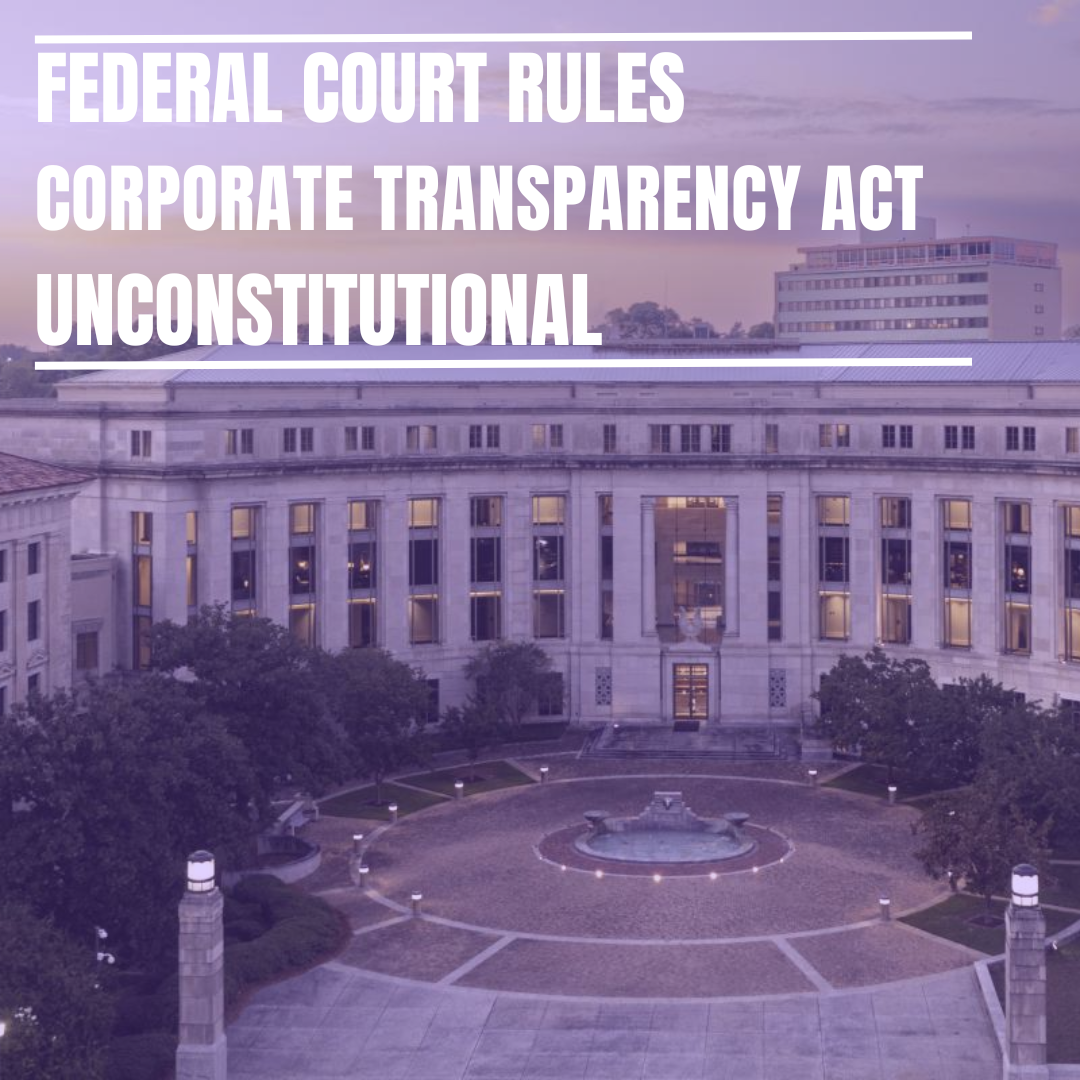Constitutional Challenges To The Corporate Transparency Act
Wed Mar 6, 2024 by OPLawSocialMedia on News

UPDATE: On March 11, 2024, the U.S. Justice Department, on behalf of the Department of Treasury filed a Notice of Appeal in response to the Alabama District Court decision declaring the Corporate Transparency Act unconstitutional. After the filing, FinCEN set forth the following statement:
While this litigation is ongoing, FinCEN will continue to implement the Corporate Transparency Act as required by Congress, while complying with the court’s order. Other than the particular individuals and entities subject to the court’s injunction… reporting companies are still required to comply with the law and file beneficial ownership reports as provided in FinCEN’s regulations.
For entities formed or first registered prior to January 1, 2024 (whose reporting deadline is December 31, 2024), reporting requirements may be more clear by either the courts before the year-end deadline or by FinCen in response to the court filing. However, newly created entities or those filed on or after January 1, 2024, that are not part of the limited group of Plaintiffs in the North District of Alabama case, the required filings are to be made within the 90 day period. For questions concerning this Update, please contact our office at contactus@oplaw.com or call us at our office at 954-384-6114.
On March 1, 2024, the U.S. District Court for the District Court of Alabama held that the Corporate Transparency Act (the “Act”) unconstitutional. The case, National Small Business Association v. Yellen, challenged the Acts reporting requirement for small businesses to disclose their beneficial owners to the Financial Crimes Enforcement Network (FinCen). The Plaintiffs claimed that the Act unfairly burdens small businesses by compelling them to divulge sensitive details about their owners to FinCen, and that it was excessive and unconstitutional to impose this on American citizens that are not under any suspicion of wrongdoing.
Why was the Act found unconstitutional?
The Court found that Congress did not have the authority to regulate millions of entities and their stakeholders the moment that they obtain formal corporate status. Specifically, the Court found that the Act exceeded the Constitution’s limits on the legislative branch and lacked a sufficient nexus to any enumerated power to be necessary or appropriate means of achieving Congress’ policy objectives.”
While the government claimed that Congress has the power to enact the Act under its power to conduct foreign affairs through its Commerce Clause authority, and as a necessary and proper exercise of its taxing power. The Court, however, rejected all of these arguments, finding that Congress’ foreign affairs powers do not extend to purely internal affairs, especially in an area that has been traditionally left for the States. However, the Court did indicate that Congress could have written a law that would have survived a constitutional challenge.
What is the Corporate Transparency Act and the beneficial ownership requirement?
As discussed in an earlier blog, Congress initially passed this anti-money laundering initiative in 2021, which took effect on January 1, 2024, by requiring, through the Corporate Transparency Act, the new beneficial ownership reporting requirement.
Beneficial ownership refers to identifying information about the individuals who directly or indirectly own or substantially control a company. Substantial control includes a senior officer, or individual that has authority to appoint or remove certain officers or a majority of directors, or an individual that is an important decision maker for the company.
Willful failure to report is punishable by a fine of $591 per day up to $10,000 and two years in prison with other penalties for nondisclosure.
What is the effect of this ruling?
The Treasury Department estimates that there are approximately 32 million businesses that are currently affected by the Act and perhaps another 5 million new businesses formed each year that will fall within the Act’s rules.
The ruling has suspended the enforcement of the Act against the Plaintiff, which also may have far reaching implications on the reporting obligations of U.S. small businesses.
The District Court ruling is poised for an appeal and may potentially land on the docket of the Supreme Court. Appeals of the ruling may take some time which leaves businesses unsure as to how to proceed.
What does this all mean?
While the Act evolved due to the government’s attempt to limit anti-money laundering and illegal activity, the Act has also sparked significant debate as to regulatory oversight and constitutional freedom. This Court ruling has placed the Act and businesses affected by the Act in limbo. Perhaps we need to see how this case unfolds before more businesses file pursuant to the Act.
From the Trenches,
Roy Oppenheim

